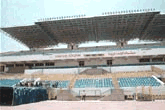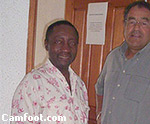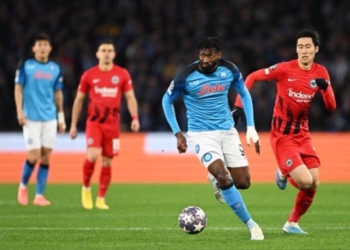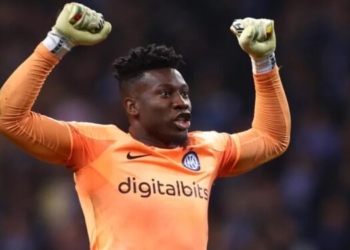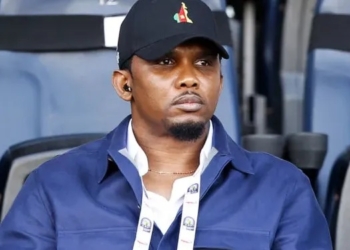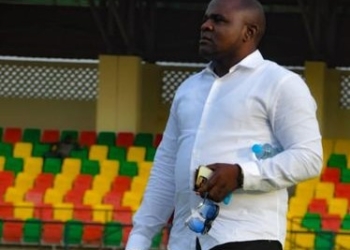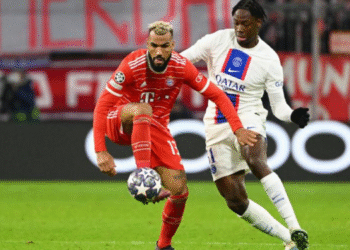Cameroon’s victories in sports and football in particular at the international scene are overwhelming. Unfortunately, the state of sports infrastructure in the country does not reflect such achievements. Cameroon cannot boost of a football stadium of international standard. The existing sports infrastructure are in deplorable states.
The Yaounde Omnisport stadium, constructed in 1972 to host the African Cup of Nations, has depreciated tremendously as a result of age and poor maintenance. It no longer meets international norms in communication, security, health, etc. The Douala reunification stadium and the Garoua Rhoumji Adja stadium are also in the same sorry state. For a football nation like Cameroon, the situation is disturbing.
The imminent construction, in Yaounde, of a polyvalent sports complex of international class with an interest-free loan from the Chinese, a sports complex in Olembe by the government, football training centre at Odza by the world football governing body, FIFA, and a sports complex in Mbankomo by the Confederation of African Football give reasons to hope that the future might be better. However, to take Cameroon out of the present infrastructure nightmare, the announced initiatives have to be achieved.
In addition, the government needs to put in place a long-term plan to build stadiums throughout the country. This entails budgetting such expenditures at national level. Given the present economic situation of the country, building one stadium in two or three years might sound difficult. But as the saying goes, « where there is the will, there is a way ». The present option of the Government is to seek partnership with foreign bodies is laudable. Clubs, local councils and enterprises should also seek to construct sports facilities which can serve the nation. In Europe and North Africa, for example, some of the best stadiums are owned by clubs and municipalities.
The presence of adequate sports infrastructure will definitely provide a conducive environment for training and get young players used to modern infrastructure. This will no doubt have a positive impact on the performance of the players, especially those involved in continental competitions.
TCHE Irene MORIKANG
Organise the African Cup of Nations
The Nations Cup is a harbinger of development in several domains.
The African Cup of Nations is the most important sports event in the continent. The biannual sports bonanza gives an opportunity for the host to be propelled to the limelight and above all upgrade its facilities in several domains. Hosting the event, will not only increase interest in football, but also help to develop the game in the country as well as upgrade sports infrastructure.
As expected, receiving the « continental show » will entail a lot of expenditure. But, the overall benefits outweigh the expenses. That is why countries, which hosted the event just a few years back, are still clamouring to receive the prestigious sports festival. A record of eight bids have been received for the 2010 nation’s cup. Apparently, countries that have had the opportunity of hosting the African Cup of Nations of recent, know it is an event worth going for. It is the harbinger of development in several domains. First, the sports facilities constructed or renovated stay after the games. All what Cameroon has today as stadiums were constructed to host the 1972 African Cup of Nations. The three new stadiums constructed in Egypt and the newly refurbished Cairo International stadium has increased sports infrastructure in the land of the Pharaohs.
In the same light, other facilities such as information technology, road network, accommodation, medical centres, as well as security will be upgraded. The country also benefits from the spotlight. Football has been the greatest « ambassador » of Cameroon and hosting another Nation’s Cup will definitely uplift the impact of Cameroon’s football in the world and boost the image of the country as well. Similarly, Cameroon’s tourism sector, in dire need of a booster, will definitely flourish before, during and after the competition.
2010 is however out of our reach. Cameroon did not present a bid to the Confederation of African Football before the October 31, 2005 deadline. The choice for the host of 2010 will be either Namibia, Zimbabwe, Libya, Senegal, Nigeria, Mozambique, Angola or Gabon and Equatorial Guinea that presented a joint bid. What about Cameroon, 2012! This will be exactly 40 years after Cameroon hosted the continental sports festival. Public support, which is usually lacking in some countries, is guaranteed in Cameroon.
TCHE Irene MORIKANG
Dominique Wansi : « Nous avons tout pour réussir »
Dominique Wansi, directeur technique national.

« Avant la CAN, les Lions Indomptables étaient au centre de plusieurs questions et eux-mêmes en proie au doute. Mais dès l’entame de la compétition, au vu de l’engagement, de la détermination et la soif de revanche des nôtres, nous avons été rassurés. Au premier tour, nous avons vu une équipe des Lions capable de tout faire et sachant se métamorphoser. Nous avons cru en la victoire finale de cette équipe, malheureusement, le rêve s’est brisé. Toutefois, la prestation des Lions augure des lendemains meilleurs, des prémices d’un renouvellement. A travers le jeu, nous avons apprécié les éléments tactiques et humains nécessaires pour rebâtir un fond de jeu, et mettre sur pied une nouvelle génération. A nous de les capitaliser. Cette opération nécessite la mise en place d’une stratégie de relance à moyen terme tout en investissant dans le long terme. L’entraîneur qui prendra les Lions en main devrait très bien connaître les joueurs. Le Cameroun a un groupe prometteur. Il faut adjoindre à l’actuelle cuvée faite des joueurs comme Stéphane Bikay, Makoun, Saidou, Mbami, Ngom Kome…des juniors. Car, il y a des talents à l’intérieur comme à l’extérieur du pays qui ne demandent qu’à être détectés. Ça doit être un travail collectif, mobilisant des personnes ressources. Nous devons mettre à profit, cette période d’hibernation que nous allons traverser pour reconstruire cette sélection avec l’ossature qui s’est dessinée au Caire ainsi que les juniors qui montent. On n’a pas à s’inquiéter au Cameroun en matière de joueurs. Nous avons nos qualités qui se transmettent de génération en génération : les qualités athlétiques, mentales, l’expérience des grandes compétitions, le physique…Ces jeunes encadrés par quelques anciens et cadres de l’équipe nationale peuvent assurer l’avenir des Lions. Nous avons tout pour réussir. Nous avons des techniciens pour ratisser le pays de long en large pour dénicher les talents. Toutefois, ce qui fait le football aujourd’hui, ce sont les conditions et les fondements qui peuvent se résumer en : la vision, l’organisation du football selon les canaux modernes de gestion, la qualité des infrastructures, les cadres techniques qualifiés et compétents, la politique de relève qui passe par l’organisation des compétitions des jeunes…Je souhaiterais aujourd’hui, une sorte de forum. Tous les techniciens camerounais devront se regarder dans les yeux et apporter leur contribution. L’équipe nationale appartient à tous les Camerounais. C’est donc l’affaire de tous. Et tout le monte doit mettre la main à la pâte pour que notre football se remoule dans le sillage et l’évolution des tendances afin qu’il retrouve sa place ».
Propos recueillis par Louis MATEA

